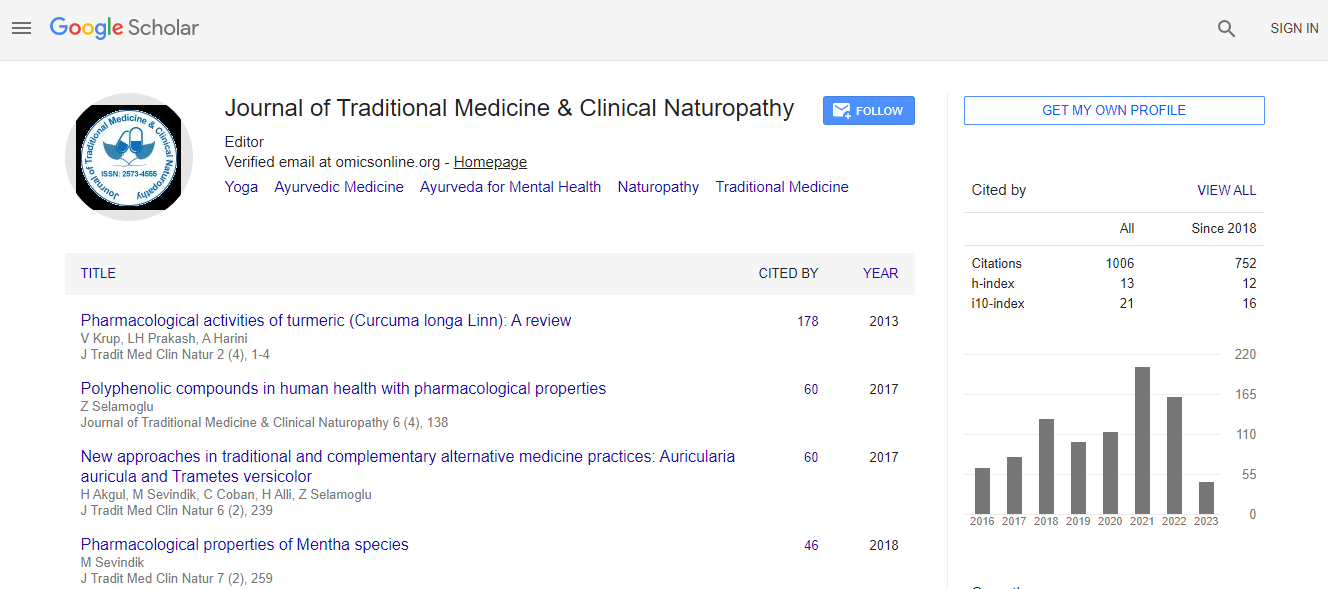Our Group organises 3000+ Global Events every year across USA, Europe & Asia with support from 1000 more scientific Societies and Publishes 700+ Open 91��ɫ Journals which contains over 50000 eminent personalities, reputed scientists as editorial board members.
Open 91��ɫ Journals gaining more Readers and Citations
700 Journals and 15,000,000 Readers Each Journal is getting 25,000+ Readers
Citations : 1504
Indexed In
- CAS Source Index (CASSI)
- Google Scholar
- Sherpa Romeo
- Open J Gate
- Genamics JournalSeek
- RefSeek
- Directory of Research Journal Indexing (DRJI)
- Hamdard University
- EBSCO A-Z
- Publons
- Geneva Foundation for Medical Education and Research
- Euro Pub
- ICMJE
Useful Links
Recommended Journals
Related Subjects
Share This Page
Effects of Toona sinensis leaf extracts on cytokine levels in RAW264.7 cells treated with LPS
6th International Conference and Exhibition on Traditional & Alternative Medicine
Szu-Ying Wu, Chia-Chun Shih, Shih-Meng Tsai and Li-Yu Tsai
Kaohsiung Chang Gung Memorial Hospital, Taiwan
Posters & Accepted Abstracts: J Tradi Med Clin Natur
DOI:
Abstract
Background: Sepsis remains a major cause of mortality in intensive care. Previous studies have pointed out that sepsis is caused by excessive inflammatory responses, leading to cell and organ damage in a host. In addition, Toona sinensis is believed to possess antioxidant and anti-inflammatory properties. Objectives: To evaluate the effects of Toona sinensis leaf extracts (TS) on the cytokine levels in the RAW264.7 cells treated with LPS. Methods: RAW264.7 macrophages were treated with TS extracts (25, 50, 75 �?¼g/mL) for 2 hours before the treatment of LPS (1 �?¼g/ ml) for 24 hours. Cytokines in the supernatants of cells were determined by Bio-Plex Pro mouse cytokine assay kit for IL-6, IL-10, and TNF-�?±, which IL-6 and TNF-�?± were proinflammatory and IL-10 was anti-inflammatory cytokines. Results: Compared with those in the control group, the levels of IL-6, TNF-�?±, and IL-10 were increased in the LPS group without TS. However, the levels of IL-6 and TNF-�?± were significantly decreased in the LPS group with TS compared with those without TS. Discussion: Our results indicated that the TS pretreatment could decrease the levels of IL-6 and TNF-�?± in the RAW264.7 cells treated with LPS. This finding was consistent with the report of Chao-Chuan Wang et al., who had proposed that the TS extracts could inhibit the level of TNF-�?± in microglia-mediated neuroinflammation by LPS. Additionally, HL Yang et al., demonstrated that the TS could suppress LPS-induced inflammation and migration in vascular smooth muscle cells via NF-�?ºB activation. Thus, we suggested that the TS might decrease the levels of TNF-�?± and IL-6 via inhibition of NF-�?ºB pathway in RAW264.7 cells treated with LPS. Conclusions: In summary, TS may be a potentially effective adjuvant therapy to LPS-induced sepsis.Biography
Szu-Ying Wu has completed his Undergraduate studies at Chang Gung University and earned his Medical degree in 2012. He is a CAM resident at Kaohsiung Chang Gung Memorial Hospital with a major in Acupuncture and Traumatology. He is the Vice Secretary-general of Taiwan Association of Chinese Medicine and Pharmacy Quality. His research topics focus on low level laser acupuncture and treatment of sleep disorders. His recent clinical interest is Sports Medicine.
Email: rickywu0818@gmail.com

